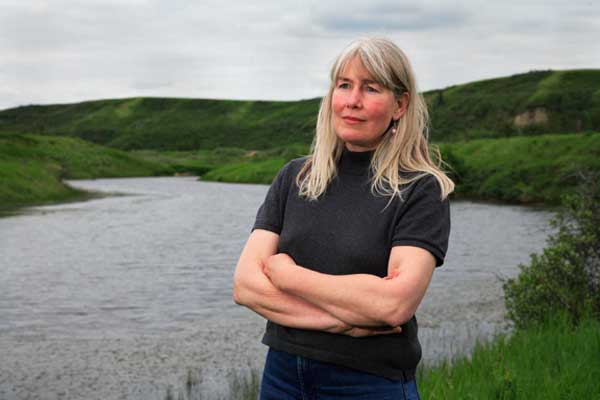The Supreme Court of Canada has rejected a motion by the country's most powerful energy regulator that citizen Jessica Ernst's case involving fracking and groundwater contamination raises no significant constitutional claim and should be dismissed.
Chief Justice Beverley McLachlin ruled that the case raised a significant constitutional question on whether or not an "immunity clause" in the regulator's legislation placed it above the Charter of Rights and Freedoms.
Is the regulator's immunity clause, asked McLachlin in her June 25 ruling, "constitutionally inapplicable or inoperable to the extent that it bars a claim against the regulator for a breach of" the Charter of Rights and Freedoms?
But Glenn Solomon, counsel for the Alberta Energy Regulator, argued in submissions to the court that "no constitutional question should be stated in the present matter."
After the Supreme Court agreed to hear the charter case last April, it required lawyers representing Jessica Ernst to clearly state the question and Solomon to agree on the wording.
But Solomon told Ernst's lawyers, "We will not be able to agree on a constitutional question."
The Alberta Energy Regulator's obstruction cost Ernst more time and money, but she is satisfied with McLachlin's ruling and definition of the final constitutional question.
"If energy regulators can violate our charter rights, there will be no protection for citizens living in areas where industry is fracking for hydrocarbons," Ernst told The Tyee.
Fracking damage alleged
Hydraulic fracturing, a technology described by industry as a combination of "brute force and ignorance," injects highly pressurized fluids into shallow and deep formations with the goal of splitting open rock as dense as concrete to release small amounts of oil and gas over vast distances.
Industry, however, cannot always control the direction of the fractures, and there have been hundreds of cases of groundwater contamination and methane leakage as well as scores of "felt" earthquakes triggered by the industry in Canada and the United States.
Eight years ago, oil patch consultant Ernst sued Alberta Environment, the Energy Resources Conservation Board (ERCB, which has since become the Alberta Energy Regulator) and Encana -- one of Canada's largest unconventional gas drillers -- over the contamination of her well water with hydrocarbons and the failure of government authorities to properly investigate the fouling of groundwater.
The $33-million lawsuit alleges that Encana negligently fractured into fresh water zones more than a decade ago; that the ERCB breached Ernst's freedoms under the Charter of Rights and Freedoms by declaring her a "security threat" and banishing all communication with her; and that Alberta Environment performed a problem-plagued investigation in bad faith.
After the Alberta Court of Appeal ruled last year that Ernst could not sue the province's energy regulator because of a protective immunity clause (the lawsuit against Encana and Alberta Environment is slowly proceeding), her lawyers asked the Supreme Court to consider reviewing the matter on constitutional grounds.
Her case raises a number of critical national issues that involve Canada's Charter of Rights and Freedoms.
The basic question the Supreme Court must now consider is this: can a provincial law allow a powerful energy regulator to violate the nation's Charter of Rights and Freedoms by banishing citizens and falsely branding them as a security threats?
The Alberta Energy Regulator, which is 100 per cent funded by industry and now headed by former energy lobbyist Gerard Protti, has been the subject of controversy and name changes in Alberta due to a series of public scandals.
Landowner critics call the agency, arguably the most powerful regulator in the country, a "captive" agency that works for industry. The public interest is not part of its current mandate.
Rachel Notley, Alberta's new NDP premier, has raised concerns about the board's direction and promises to shake up the organization.
"One of the concerns that I have always had with the Alberta Energy Regulator is that it appears to have a conflicting mandate, in that it is both a promoter of energy and the primary vehicle of environmental protection in Alberta," Notley recently told the Calgary Herald.
Case to be heard in 2016
Ernst's case has become a celebrated one in Alberta, and much watched by the legal community and oil and gas industry.
One major legal firm, Borden Ladner Gervais, recently noted in a blog that the Supreme Court decision to hear the case could have a "significant impact on the board, the Alberta Energy Regulator, any other regulatory tribunal that has statutory protection from civil liability or actions, and any potential future claimants who may consider bringing an action against a statutory body that has legislative protection.
"We look forward to the guidance from the Supreme Court as to the proper framework for addressing the interplay between statutory immunity provisions and charter damages claims against state actors."
The Ernst case will be heard next year by the Supreme Court. Attorney generals from the provinces have until December to intervene in the case.
If the court rules that the regulator's immunity clause does not protect it from civil action brought under the Charter of Rights of Freedoms, then Ernst's case will return to Alberta's courts where it will resume against Encana, Alberta Environment and the Alberta Energy Regulator. ![]()
Read more: Energy, Local Economy, Rights + Justice, Environment

















Tyee Commenting Guidelines
Comments that violate guidelines risk being deleted, and violations may result in a temporary or permanent user ban. Maintain the spirit of good conversation to stay in the discussion.
*Please note The Tyee is not a forum for spreading misinformation about COVID-19, denying its existence or minimizing its risk to public health.
Do:
Do not: